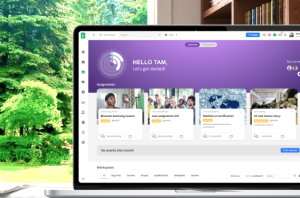Frontline workers differ from those with computer access or office-based roles. Ensuring they have equal access to learning opportunities requires a thoughtful approach.
More than 2.7 billion front-line workers in industries like retail, catering, and manufacturing keep the global economy running.
To navigate frontline worker learner engagement and retention, companies must go beyond the current labour supply-demand gap and understand how different types of workers learn and what they value or dislike most about training and development.
Since 76% of those in the consumer and retail sector quit their jobs to leave employment entirely rather than work in the same or any other industry again, ensuring learning and development (L&D) are fit for purpose is crucial for both their professional growth and the success of an organisation.
This blog explores the learning hurdles faced by frontline employees. It also provides information about their preferences and practical solutions to incorporate into your L&D strategy.
What is a frontline worker?
Put simply, frontline workers are those who do not sit at a desk, work in an office, or have computer access. These individuals are often the first point of contact for customers and play a crucial role in delivering products or services.
Frontline workers include individuals employed in (but not limited to):
- Food and goods provisions: restaurant staff, factory floor workers, such as vehicle mechanics and machinery operators
- Education and childcare: Teachers and nursery staff, social carers, specialist education professionals, like children’s disability support workers
- Public services and security: Postal workers, park rangers, building inspectors, and police officers
- Health and social care: Doctors, nurses, paramedics, and social workers
- Transport and logistics: Delivery drivers, truck and bus drivers, flight attendants, and railway engineers
Skills-based organisations recognise frontline workers as valuable assets and prioritise their development. They empower deskless employees to take ownership of their L&D journey and seek opportunities for growth and advancement.
Barriers to inclusive learning for frontline workers
Gallup reports that low employee engagement costs the global economy $8.8 trillion. What’s more, despite 93% of leaders dedicating substantial time to training frontline staff, 83% lacked confidence in employees’ customer interaction abilities.
This is because frontline staff require a specific set of skills. They represent an organisation and handle critical interactions, often serving as the initial contact for customers. They must excel in communication, empathy, and common sense; otherwise, a company risks customer dissatisfaction, a damaged reputation, and high employee turnover.
When you consider that eight in ten frontline workers don’t even have a work email, it’s difficult to implement personalised learning pathways or provide consistent and timely training.
There is good news.
Over 70% of frontline staff seek career advancement opportunities with their current employers or elsewhere. This signals a strong desire for professional growth. And when it comes to job satisfaction, 80% of employees say learning adds purpose to their work, and happier employees are 13% more productive.
It stands to reason that properly training frontline employees should be a priority.
To effectively support frontline workers, organisations must embrace L&D, whether by enhancing the employee experience through accessible learning platforms or optimising training to ensure it is fit for purpose.
Remove barriers frontline workers face and increase participation, employee morale, and job satisfaction.
Lack of awareness
Knowledge is power, right?
When frontline workers don’t know what training is available, they miss opportunities for skill development and career advancement.
By improving communication through multiple channels such as collaboration software, newsletters, and virtual team meetings, frontline workers have the information they need to make informed decisions and participate in learning programmes.
Lack of training and development programmes
Not only do frontline workers find it difficult to find out about L&D initiatives, but many companies also do not offer the right L&D programmes to help employees acquire the skills needed for higher-level positions. This leads to reduced job satisfaction and higher turnover rates.
To address the lack of L&D programmes, conduct regular training assessments to identify frontline workers’ specific skills and development needs. Reduce the potential for inefficient resource planning and training initiatives disconnected from broader organisational goals and priorities.
Leverage smart reporting to optimise resource allocation and predict future needs. Performance metrics can identify areas where deskless employees are struggling, enabling you to provide targeted interventions to support their development.
By having a systematic approach to meet the training needs of frontline workers, you can take full advantage of opportunities for improvement.
Limited career pathways
Research by McKinsey states just 17% of frontline employees have frequent discussions about career advancement.
Limited opportunities for upward mobility make it challenging for frontline employees to advance their careers, resulting in stagnant career paths, frustration, and disengagement. It’s hardly surprising that 49% of companies consider succession planning a top priority.
Support frontline workers in recognising the value of education and training to boost their motivation, job satisfaction, and productivity. Create personalised development plans that align with their career goals and the company’s succession planning needs, providing workers with clear career advancement opportunities and increased job security.
Lack of context
Education and training programmes are typically designed for deskbound workers. This means frontline employees are almost condemned, struggling to build skills without enormous effort. This can mean the best people will find a way and leave.
Software like Blossom uses artificial intelligence (AI) to recommend content and courses according to the skills required for the user’s current position. This means frontline workers can a) easily access relevant training resources, facilitating skill development without the added burden of searching for appropriate materials, and b) save time and effort by avoiding training sessions unrelated to their role.
By integrating AI-driven solutions, organisations can ensure that their L&D programs are inclusive and supportive of all employees, enhancing retention and fostering a more skilled and satisfied workforce.
Top tip: Why not involve individuals or teams in programme design to address the lack of context? When employees share their unique insights, it increases buy-in for professional growth and helps them understand how the learning content is relevant and beneficial.
Inadequate support and mentorship
Almost half of businesses invest in career mentoring and coaching to boost employee retention. Employees often lack access to mentors or support systems that can retain top talent, guide them through their career development, and help them navigate challenges, such as adapting to changes or addressing workplace conflicts.
Overcome barriers by developing mentorship programmes that pair experienced employees with newer hires, providing them with guidance, support, and opportunities for professional growth.
Create a supportive work culture where employees feel comfortable seeking advice and feedback from colleagues and managers, fostering a sense of belonging by offering:
- Reverse mentoring opportunities to encourage junior frontline employees to mentor senior staff members on topics like technologies and social media trends.
- Anonymous feedback methods allow frontline workers to anonymously input their thoughts and ideas on management practices, company policies, and team dynamics. This allows for honest input without fear of reprisal and promotes transparency in addressing issues.
- Gamified learning to create challenges with coworkers. Leaderboards, badges, and rewards incentivise participation and make the feedback process more engaging and enjoyable for frontline employees.
Work-life harmony issues
The demanding nature of deskless jobs makes it challenging for employees to prioritize skill development. With varying schedules, including night shifts and part-time hours, participation in face-to-face training sessions becomes impractical for these workers.
Professional development shouldn’t disrupt an employee’s work-life balance. By understanding the learning needs of frontline workers, you can enhance participation and motivation.
To promote the well-being of frontline workers, get valuable insights into their scheduling constraints and preferences for training delivery with employee listening strategies, such as surveys and focus groups.
By hosting focus groups, organisations can understand workers’ scheduling challenges. This helps customise training to their needs, increasing enjoyment and participation–while respecting their personal lives.
Workplace culture
According to a recent report, toxic workplaces continue to drive the Great Resignation.
Workplace culture is crucial for motivating skill improvement and influencing the success or failure of an organisation. When companies devalue L&D, they suffer the consequences. This includes a rise in frontline employees leaving for competitors, as well as a decline in morale and productivity among those who remain.
To tackle this, take a proactive approach to dealing with harmful work environments. When deskless workers feel comfortable and supported in their surroundings, they are more likely to be motivated to enhance their skills. Offer accessible training programmes about topics such as assertiveness and cultural sensitivity to empower deskless workers to navigate a toxic work culture.
Offer the right training at the right time
As you can see, failing to understand how frontline workers learn can negatively impact an organisation. Inadequate upskilling and reskilling strategies may hinder innovation and competitiveness and damage your reputation.
Consider a cleaning operative at a top hotel chain. If training methods don’t align with their role or are offered at the wrong time, for example, using outdated legislation, vital procedures may not be fully understood. This can result in misuse of cleaning products or equipment, leading to damage, unmet compliance, and safety risks.
Plus, if cleaning staff aren’t trained correctly to handle hazardous chemicals or operate cleaning machinery, the risk of accidents and injuries rises. This not only endangers employees but can also pose risks to guests.
Ensure L&D initiatives are timely, relevant and cater to frontline workers’ diverse needs to avoid negative impacts.
Let’s explore.
Formal structured training programmes
Although somewhat restrictive, structured programmes, like face-to-face workshops and courses provided by the company or external trainers, can offer several benefits for frontline workers.
For example, by organising face-to-face customer service training, workers can set aside their daily responsibilities and focus on improving their knowledge and skills. In addition, as workers come together to learn, they build relationships and collaborate to find solutions that enhance their performance.
Not only that, but face-to-face training allows for immediate feedback and hands-on practice, which can be more effective than online or self-paced learning methods. Trainers can provide personalised guidance, address specific questions or concerns, and ensure all participants fully grasp the material. This real-time interaction helps reinforce learning and boosts employee confidence in applying new skills on the job.
By engaging in real-time group activities and discussions, workers can share their experiences, learn from each other, and develop a collective understanding of best practices. This democratic learning environment can lead to innovative ideas, such as improving customer service rates and optimising internal processes.
Blossom has a range of tools to engage and empower frontline employees to work together. A centralised “source of truth” knowledge repository ensures consistency of messaging and reduces information accuracy loss. At the same time, networking forums, blogs, and content commenting mechanisms boost internal communications across and within teams of frontline workers.
Learning in the flow of work
Alarmingly, two-thirds of employees feel their workload is out of control for at least three days per week. As businesses face increasing time constraints, learning in the flow of work addresses these challenges by providing frontline workers with opportunities to learn while performing their job tasks.
Hands-on experience and learning through practical application, often guided by more experienced colleagues, can unlock the full potential of frontline employees by seamlessly integrating learning into their daily tasks. As learning aligns with the natural workflow, frontline workers can continuously acquire new skills and insights while performing their routine duties.
For instance, providing opportunities for job rotation across various departments can expose warehouse workers to different facets of the supply chain, broadening their skill set.
Similarly, implementing job shadowing programmes can be beneficial for teachers. Newly qualified staff can learn by observing experienced colleagues teaching and gaining valuable insights into techniques and strategies.
Peer Learning
Empowering frontline workers to share knowledge, experiences, and best practices with their co-workers can enhance their skills and capabilities.
Consider a restaurant that needs to improve its regular menu. Through knowledge-sharing sessions, servers and kitchen staff attend weekly meetings to discuss menu items in detail. Experienced servers share their insights and recommendations for upselling certain dishes or even pairing food and drinks.
This peer learning deepens their understanding of the menu, improves their ability to make recommendations to customers, and helps improve customer satisfaction. What’s more, as frontline staff are involved in decision-making, they feel a sense of ownership and responsibility, leading to increased job satisfaction.
Microlearning modules
Frontline workers benefit from accessible e-learning modules, mobile apps, and online resources, providing convenient on-the-go training.
Although 25% of deskless workers face technology and flexibility constraints, and 70% seek more tech-enabled work, businesses can harness these devices for micro-learning. However, only 1% of enterprise technology spending caters to companies serving deskless workers.
Help your frontline staff to quickly apply new concepts or techniques at a time that suits them, not you. Microlearning provides brief, 2-5-minute sessions accessible via mobile devices, fitting seamlessly into commutes or breaks. This empowers frontline workers to improve their skills without interrupting work or personal commitments.
Boost frontline learner engagement
Frontline workers are trained differently than other staff members—and they have to be. They might not have their own space or access to the same technology as others.
By understanding how deskless workers learn and offering a range of flexible, accessible, and unique training methods for working conditions, you can create a better learning environment for those on the ground.
Blossom can help your organisation increase learner engagement and create a culture of continuous learning among frontline employees. Schedule a demo today.








